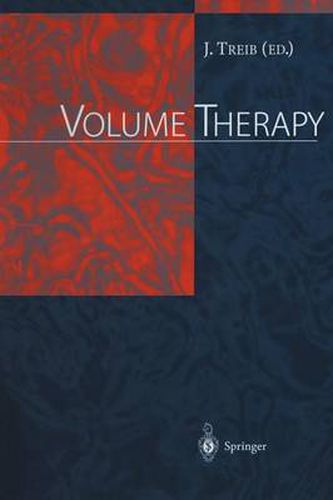Readings Newsletter
Become a Readings Member to make your shopping experience even easier.
Sign in or sign up for free!
You’re not far away from qualifying for FREE standard shipping within Australia
You’ve qualified for FREE standard shipping within Australia
The cart is loading…






This title is printed to order. This book may have been self-published. If so, we cannot guarantee the quality of the content. In the main most books will have gone through the editing process however some may not. We therefore suggest that you be aware of this before ordering this book. If in doubt check either the author or publisher’s details as we are unable to accept any returns unless they are faulty. Please contact us if you have any questions.
Volume therapy or infusion therapy is used worldwide for the treatment of hypovolemia caused by surgical blood and plasma losses, trauma, burns, or infections. Interestingly, significant differences exist between countries regarding the use of plasma substitutes. In the United States, crystalloids and albumin are more popular, whereas in Europe artificial colloids such as hydroxyethyl starch are preferred. From an international perspective, it is notable that volume therapy using hydroxyethyl starch is an established therapy for the treatment of cerebral, retinal, otogenic, and peripheral circulation disorders in Germany. In other countries, crys talloids are mostly used to treat dehydration or hypovolemia, for example in brain stroke. In recent years, new data made it possible to overcome national differences and agree on an evidence-based, international con sensus. The efficacy of different plasma substitutes for a volume therapy last ing several days has not been sufficiently studied in the past. Long-term volume therapy of patients with cerebral perfusion disorders is an excel lent model for studying the effects of artificial colloids in detail, because of the high doses of colloids that are administered. Through a compari son of commonly used plasma substitutes, we were able to show that sig nificant differences exist between different colloids, for example in their effect on coagulation. After repeated infusion, hydroxyethyl starches that are difficult to degrade lead to an accumulation of large molecules that are difficult to eliminate. These large molecules impair factor VIII/von Willebrand factor.
$9.00 standard shipping within Australia
FREE standard shipping within Australia for orders over $100.00
Express & International shipping calculated at checkout
This title is printed to order. This book may have been self-published. If so, we cannot guarantee the quality of the content. In the main most books will have gone through the editing process however some may not. We therefore suggest that you be aware of this before ordering this book. If in doubt check either the author or publisher’s details as we are unable to accept any returns unless they are faulty. Please contact us if you have any questions.
Volume therapy or infusion therapy is used worldwide for the treatment of hypovolemia caused by surgical blood and plasma losses, trauma, burns, or infections. Interestingly, significant differences exist between countries regarding the use of plasma substitutes. In the United States, crystalloids and albumin are more popular, whereas in Europe artificial colloids such as hydroxyethyl starch are preferred. From an international perspective, it is notable that volume therapy using hydroxyethyl starch is an established therapy for the treatment of cerebral, retinal, otogenic, and peripheral circulation disorders in Germany. In other countries, crys talloids are mostly used to treat dehydration or hypovolemia, for example in brain stroke. In recent years, new data made it possible to overcome national differences and agree on an evidence-based, international con sensus. The efficacy of different plasma substitutes for a volume therapy last ing several days has not been sufficiently studied in the past. Long-term volume therapy of patients with cerebral perfusion disorders is an excel lent model for studying the effects of artificial colloids in detail, because of the high doses of colloids that are administered. Through a compari son of commonly used plasma substitutes, we were able to show that sig nificant differences exist between different colloids, for example in their effect on coagulation. After repeated infusion, hydroxyethyl starches that are difficult to degrade lead to an accumulation of large molecules that are difficult to eliminate. These large molecules impair factor VIII/von Willebrand factor.